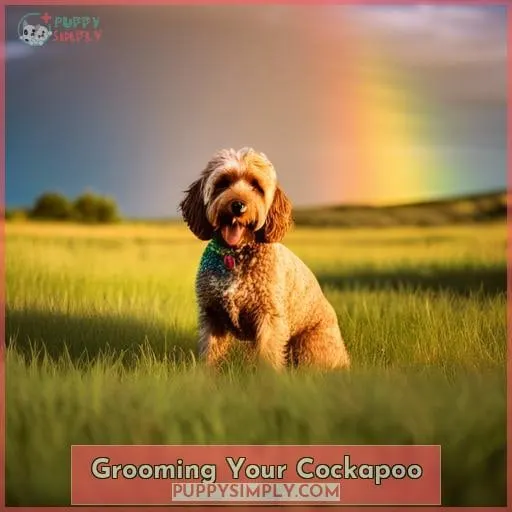This site is supported by our readers. We may earn a commission, at no cost to you, if you purchase through links.
 In a world where the quest for the perfect pet often feels like searching for a needle in a haystack, the Cockapoo emerges as a beacon of hope for allergy sufferers everywhere.
In a world where the quest for the perfect pet often feels like searching for a needle in a haystack, the Cockapoo emerges as a beacon of hope for allergy sufferers everywhere.
This delightful blend of Cocker Spaniel charm and Poodle intelligence isn’t just a feast for the eyes; it’s a breath of fresh air for those plagued by sneezes and sniffles.
But before you jump on the bandwagon, let’s dive deep into the Cockapoo’s:
- Hypoallergenic claims
- Grooming essentials
- How to care for this furry bundle of joy
To ensure a harmonious match for your allergy-sensitive household.
Table Of Contents
Key Takeaways
- Cockapoos inherit a low-shedding coat from their Poodle parentage, which can make them a more suitable option for individuals with allergies, as they produce less dander.
- Despite the low-shedding trait, no dog breed is completely hypoallergenic, and individual reactions to a Cockapoo’s dander, saliva, or urine can still trigger allergies.
- The degree of hypoallergenic qualities in Cockapoos can vary based on the specific type of coat they inherit, with F1b Cockapoos (75% Poodle) often considered the most hypoallergenic due to their higher Poodle genetic influence.
- Prospective owners with allergies are advised to spend time with a Cockapoo before bringing one home to ensure compatibility, as individual sensitivities and the specific dog’s characteristics can influence allergic reactions.
Understanding Cockapoos
Let’s get to know Cockapoos, a charming crossbreed between Cocker Spaniels and Poodles.
Known for their friendly and energetic nature, these dogs have a unique blend of characteristics that make them a popular choice among dog lovers.
We’ll explore their history, hypoallergenic properties, and what makes them such a delightful breed to own.
Cockapoo Overview
Amidst the myriad of dog breeds, you’ll find the Cockapoo, a crossbreed that marries the intelligence and low-shedding coat of the Poodle with the amiable personality of the Cocker Spaniel.
Cockapoo grooming: Regular brushing keeps their curly, hypoallergenic coat healthy.
Cockapoo size: Varies due to mixed parentage, ranging from small to medium.
Cockapoo temperament: They’re friendly, easily trainable, and energetic.
Cockapoo lifespan: Typically, they live for 13+ years.
Cockapoo training: Their intelligence and eagerness to please make training a breeze.
Breed History
The Cockapoo, a crossbreed between a Cocker Spaniel and a Poodle, first emerged in the United States during the 1960s.
Its origins trace back to a desire for combining the Poodle’s hypoallergenic, low-shedding coat with the Cocker Spaniel’s friendly demeanor.
This blend not only catered to allergy sufferers but also sparked the breed’s rapid popularization, marking a significant chapter in its historical development and genetic heritage.
Cockapoo Attributes
Let’s explore the attributes of Cockapoos, focusing on their size, appearance, temperament, and health considerations.
As a potential Cockapoo owner, understanding these aspects is crucial.
This will help you know if this breed is the right fit for you, especially if you’re looking for a hypoallergenic pet.
Size and Appearance
Cockapoos’ size and appearance are quite diverse, reflecting their mixed heritage.
Variations in height, weight, and coat characteristics are common.
Their size can range from small to medium, influenced by the Poodle parent’s size.
Coat diversity is also notable, with colors spanning from black to cream.
The coats can be curly or wavy, affecting the amount of shedding and dander produced.
Predicting appearance can be challenging due to the crossbreed characteristics.
Despite these size variations and coat differences, Cockapoos’ charm lies in their unique blend of mixed parentage.
Temperament and Behavior
Cockapoos exhibit a delightful blend of intelligence and affection, making them highly sociable and eager to engage in play or cuddle sessions with their families.
Their temperament and behavior are influenced by:
- Regular brushing
- Environmental enrichment
- Behavioral training
Understanding canine communication and employing socialization techniques early, especially in a puppy, can enhance family dynamics and ensure your hypoallergenic Cockapoo thrives.
Lifespan and Health Considerations
When considering a Cockapoo’s lifespan and health, it’s important to know they typically live between 12 to 15 years.
This can vary based on several factors including size, genetics, and care.
Your furry friend’s longevity and well-being hinge on effective health management.
Wellness strategies, addressing aging considerations like sensitive skin, ear infections, and digestive problems, are key to surpassing the 13+ years lifespan despite potential health issues.
Cockapoos and Allergies
When considering a Cockapoo as a pet, it’s crucial to understand their relationship with allergies.
These charming dogs inherit the Poodle’s low-shedding coat, which produces less dander, a common allergen.
This trait makes Cockapoos a potentially good match for individuals with mild to moderate allergies.
However, no dog is truly hypoallergenic, and individual reactions can vary.
Regular grooming and cleanliness are key to minimizing allergens and making life with a Cockapoo more comfortable for allergy sufferers.
Hypoallergenic Traits
One might find that Cockapoos, with their Poodle lineage, exhibit hypoallergenic qualities.
Due to their curly, low-shedding coats, which produce less dander, their genetic predisposition for less shedding and reduced dander means less allergens in the environment.
Still, coat type and individual reactions vary, so allergy testing and supervised interaction can determine if a specific Cockapoo will trigger allergies before making a lifetime commitment.
Regular grooming and care are essential for minimizing allergens.
Impact on Allergy Sufferers
For allergy sufferers, Cockapoos present an appealing pet option due to their generally hypoallergenic coat traits inherited from their Poodle parent.
While reactions vary based on personal sensitivity, many find Cockapoos’ low-shedding, low-dander coats manageable.
Consult an ethical breeder about particular puppies’ coat types.
Adjustments like frequent bathing, thorough grooming, and diligent housecleaning further accommodate this lively, affectionate, and easily trained cocker spaniel/poodle mix.
Types of Cockapoos
As we just discussed, Cockapoos are often considered hypoallergenic due to their Poodle ancestry.
However, there are different types of Cockapoos that can influence allergy-friendliness.
The amount of Poodle parentage affects the curliness of the coat and dander production, which impacts allergy sufferers.
Variations and Allergies
Your Cockapoo’s tendency to aggravate allergies depends on its generation, with F1b Cockapoos being the most hypoallergenic at 75% Poodle.
When selecting a Cockapoo, consider coat variability between dogs and the impact on allergy management.
The curliest coats like those of F1b Cockapoos are best for allergy sufferers.
Spend time with your potential pup to test reactions before final breed selection.
Influence of Poodle Parentage
You’ll find the different types of Cockapoos can impact allergy friendliness based on their amount of Poodle parentage.
With greater Poodle genetic inheritance comes increased curly coat characteristics that reduce troublesome dander for allergy sensitivity.
F1b Cockapoos have the most Poodle coat influence, optimizing dander reduction, though individual coat variation persists.
Grooming Your Cockapoo
Grooming is essential to maintaining a Cockapoo’s allergy-friendly coat.
Regular brushing helps remove loose hair and dander, while bathing keeps skin and coat clean.
Pay close attention to the ears and trim nails monthly to reduce sources of allergens.
Coat Maintenance
The grooming and maintenance of your Cockapoo’s coat is important for managing allergens.
- Regularly brush and bathe your dog to remove dead hair and dander.
- Trim the coat every 6-8 weeks to minimize shedding and keep it tidy.
- Establish a routine grooming regimen tailored to your dog’s coat type to control allergens and keep their skin and coat healthy.
Regular Brushing: Essential for detangling and removing loose fur.
Professional Grooming: Advised for optimal coat health and appearance.
Coat Trimming: Keeps the coat manageable and reduces matting.
Ear Cleaning and Nail Care: Prevents infections and maintains overall well-being.
Impact on Allergen Levels
Keeping up with regular grooming practices can significantly reduce allergen levels in your Cockapoo’s environment, making a noticeable difference for allergy sufferers in your household.
By incorporating cleaning routines into your lifestyle adjustments, you can manage environmental factors contributing to allergies.
Training and Caring for Your Cockapoo
Training and caring for your Cockapoo involves more than just teaching them commands; it’s about ensuring they lead a balanced and happy life.
Exercise requirements and mental stimulation are key components of their overall well-being.
By incorporating daily physical activities and engaging their minds, you’ll help your Cockapoo thrive.
Exercise Requirements
A well-rounded exercise routine for your Cockapoo should include at least an hour of physical activity daily, complemented by mental challenges to keep them engaged and healthy.
Outdoor adventures can provide both physical activity and mental engagement.
Mental Stimulation
After ensuring your Cockapoo’s physical exercise needs are met, it’s equally important to focus on their mental stimulation, as this breed is known for its intelligence and eagerness to learn.
- Engage them with brain games that challenge their problem-solving skills.
- Introduce puzzle toys to keep their minds active and entertained.
- Incorporate interactive play into daily routines, ensuring a well-rounded enrichment experience.
Choosing Your Cockapoo
When selecting your Cockapoo, it’s crucial to consider their compatibility with allergy sufferers.
They’re often favored for their Poodle lineage, which tends to be more allergy-friendly.
While no dog is truly hypoallergenic, Cockapoos with curlier coats, like the F1b generation, are generally more suitable for those with allergies due to lower shedding and dander production.
Additionally, the price of a Cockapoo puppy can vary.
So, it’s important to choose a reputable breeder and consider the long-term commitment of grooming and potential health care costs.
Considerations for Allergy Sufferers
When choosing your Cockapoo, perfection requires meeting potential puppies in person.
This allows you to gauge individual allergy reactions before commitment.
Coat type, shedding habits, and environmental factors differ among individuals.
Therefore, allergy management depends on:
- Genetic predisposition
- Environmental control
- Lifestyle adjustments to reduce allergens
Personal contact allows evaluating allergy potential.
This helps you find your ideal hypoallergenic companion.
Cockapoo Puppies and Price
When choosing your Cockapoo puppy, you’ll find the price varies based on factors like:
- Breeder reputation and ethical breeding practices
- Desired puppy size – teacup, toy, miniature, standard
- Coat type – tight curls, loose waves, thickness
- Your location – pricing varies by region
Consider these key factors when determining price.
Research and compare prices from different breeders to find a fair and reasonable cost for your perfect Cockapoo puppy.
Frequently Asked Questions (FAQs)
What health problems are common in cockapoos?
Cockapoos may face health issues like:
- Joint problems
- Ear infections
- Hereditary eye conditions
- Skin disorders
- Metabolism-related diseases
Regular vet visits and preventive care are crucial for their well-being.
How much exercise does a cockapoo need each day?
Your Cockapoo needs about an hour of exercise daily.
This can be split into two 30-minute walks or one longer walk.
Regular exercise keeps them healthy, prevents boredom, and curbs destructive behaviors.
Are cockapoos good with children and other pets?
As the saying goes, a house isn’t a home without a pet.
Cockapoos make the perfect addition, being affectionate with children and sociable with other pets.
How can I find a reputable cockapoo breeder in my area?
To find a reputable Cockapoo breeder:
- Research online for breeders in your area, check their reputation, and visit their facilities.
- Look for breeders registered with organizations like the American Cockapoo Club.
- Ask about health screenings, breeding practices, and meet the parent dogs.
- Always trust your instincts.
What is the average lifespan of a cockapoo?
Imagine a world where your furry companion, a Cockapoo, could share your life’s journey for up to 15 years, and sometimes even beyond, reaching the ripe old age of 20 or more.
With their blend of Cocker Spaniel and Poodle genes, Cockapoos typically enjoy a lifespan of 12 to 15 years.
This small to medium-sized bundle of joy, known for its intelligence, affection, and hypoallergenic coat, could be your sidekick for many memorable years, given the right care and love.
Conclusion
With over 50% of Cockapoos eliciting low to no allergic reactions, you’d be barking up the wrong tree to dismiss this breed if allergies are a concern.
Their Poodle ancestry grants Cockapoos a hypoallergenic edge, but diligent grooming and consistent vet visits are key to preserving those coveted low-allergen locks.
So breathe easy — with attentive care and upkeep, the Cockapoo can be the perfect companion for allergy sufferers seeking both canine friendship and sniffle-free living.













